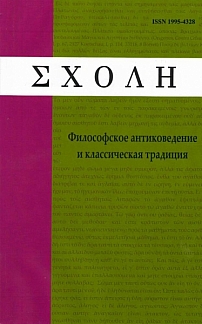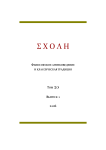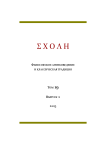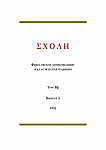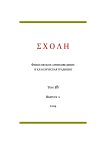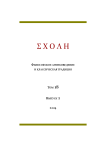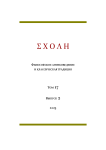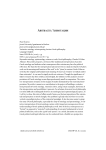Schole. Философское антиковедение и классическая традиция @classics-nsu-schole
Schole. Философское антиковедение и классическая традиция
ΣΧΟΛΗ (Schole). Философское антиковедение и классическая традиция = Ancient Philosophy and the Classical Tradition - журнал Центра изучения древней философии и классической традиции. Публикуются исследования по истории античной философии и науки, переводы классических текстов, рецензии, аннотации и библиографические обзоры.
Федеральное государственное автономное образовательное учреждение высшего образования "Новосибирский национальный исследовательский государственный университет"
Выпуски журнала
Статьи журнала
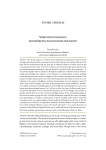
Veritative ontology: reinterpreting Ancient Greek philosophy
Статья научная
This article proposes a revision of the traditional interpretation of ancient Greek ontology and indicates what consequences this revision may have for political reflection. The basis for the interpretation laid out here lies in classicist Charles H. Kahn’s work on the meaning and function of the verb “to be” (einai) in ancient Greek. Kahn asserts that the original and fundamental meaning of einai was veritative (veridical) rather than existential – it was used to signify truth, not existence. Though the significance of Kahn’s research has been widely acknowledged, the influence of his analyses on interpretations of Greek ontology seems disproportionately small in comparison. The veritative interpretation remains on the margin of studies dominated by the existential interpretation. My article is meant as a contribution to the project of building a veritative interpretation of Greek ontology. I intend to show, using certain examples, the forms of this interpretation and possibilities it presents. For scholars of ancient Greek philosophy, it is often difficult to distinguish between its ontological and epistemological aspects. As I will try to show, this state of affairs results from a post factum imposition of the existential interpretation on Greek thought. The problem is greatly reduced when we use the veritative paradigm in place of the existential paradigm. It also becomes easier to grasp the unity of Greek philosophy, especially the unity of ontology and epistemology. A veritative interpretation of Greek ontology carries with it important consequences for our understanding of Greek political philosophy as well. One of the key consequences is a “formal” (as opposed to “material”) understanding of concepts fundamental to Greek political reflection, such as the “good” and “justice.” As a result, discussion on ancient Greek political and legal reflection can be conducted from a fruitful new perspective.
Бесплатно
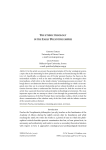
Τhe ethnic theology in the Early Byzantine empire
Статья научная
In this article we present the general principles of Proclus’ ontological system, a topic that is also interesting for how spiritual activities are formed during the fifth century A.C. Specifically, we elaborate one of Proclus’ greatest theories, the theory on the intermediate realities as well as the main methodology in which he investigates these intermediates, which refers to the triadic schema “remaining-procession-reversion”. Although there is no distinction between theory and the methodology in which it is investigated, since they are in a mutual relationship and are almost identified, we make a distinction between them to understand the Proclean system. So, both the sections of our article have a general theoretical and particularly methodological orientation. The most important aspect that we attempt to show is how through the geometrically structured pyramidal openness of the first Principle these intermediate realities, which exclude the direct communication of the absolute unity of the One-Good with the infinite variation of the natural world, are formed.
Бесплатно
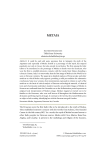
Статья научная
It could be said with some precision, that in Antiquity the myth of the Argonauts and especially of Medea herself as a personage of this myth, has enjoyed popularity not only in Greece but also outside its territories. The first among the Italic tribes to be introduced to the personage of Medea no doubt were the Etruscans, who were the first to establish intensive contacts with the Greeks from Euboea founding a colony in Cumae, Italy. It is noteworthy that the first image of Medea in the World Art is seen on Etruscan ceramics. The paper gives detailed analyses of Etruscan olpe and other artefacts on which Medea early appears, providing a solid precondition for substantive conclusions. Some new versions of an interpretation expressed in relation to each of the artefacts on the basis of critical analysis of Etruscan archeological material, of classical texts and of previously undertaken modern research, are provided. Images of Medea in Etruscan art confirmed from the Orientalist era to the Hellenization period represent an original, local interpretation of Medea's image. Medea's magical art turned out to be familiar to the Etruscans, who were well known all throughout the Mediterranean for divination and being experts of magic. In contrast to the Greeks, they turned Medea into an object of cult worship, identifying her with the Etruscan sun god Cavatha.
Бесплатно
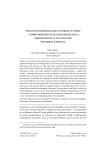
Статья научная
L'auteur de l'article tente de relier l'observation des relations économiques et commerciales développées par les Phéniciens dans la partie occidentale de la Méditerranée à une réflexion sur la situation dans laquelle se trouvaient les pays du Levant. On sait qu'à l'époque où la fondation de Carthage peut être hypothétiquement localisée, les centres phéniciens étaient sous pression politique, économique et militaire - principalement de l'Assyrie - bien que d'autres puissances, comme Damas, ne puissent être exclues. D'autre part, cependant, on sait que, par exemple, dans la science allemande l'absence d'acte fondateur de Carthage en Afrique du Nord a été soulignée, et les traces archéologiques laissées sur ce territoire semblent insuffisantes pour concilier les relations littéraires conventionnelles avec l'acte fondateur. de Carthage à la fin du IXe siècle av. L'intention de cet article est de tenter de montrer les enjeux à partir desquels il convient d'envisager la réinterprétation des événements rapportés dans le contexte de la fondation de Carthage. Cette démarche servirait à réviser les connaissances scientifiques existantes sur la chronologie de la fondation de Qarthadasht et pourrait, par conséquent, contribuer à montrer que la fondation de Carthage s'inscrit dans une période postérieure - c'est-à-dire la fin du VIIIe ou le début du VIIe. siècle avant notre ère.
Бесплатно
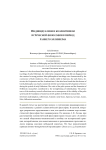
Индивидуализм и коллективизм в греческой философии в период раннего эллинизма
Статья научная
Было установлено, что, несмотря на распространение индивидуализма в философских учениях раннего эллинизма, коллективистская составляющая не только не исчезла, но и сохранила прочные позиции. Для большинства философских учений было характерно сосуществование обеих тенденций. Это хорошо заметно у Эпикура, ранних стоиков, Анникерида, перипатетиков и академиков. Также было установлено, что данная особенность греческой философии была тесно связана с социально-историческим развитием Греции в период раннего эллинизма. Усилению индивидуализма способствовали кризис полисной системы и образование эллинистических монархий. Сохранение тенденции к коллективизму было следствием жизнеспособности полисной системы и основания многочисленных греческих полисов в эллинистических монархиях.
Бесплатно

